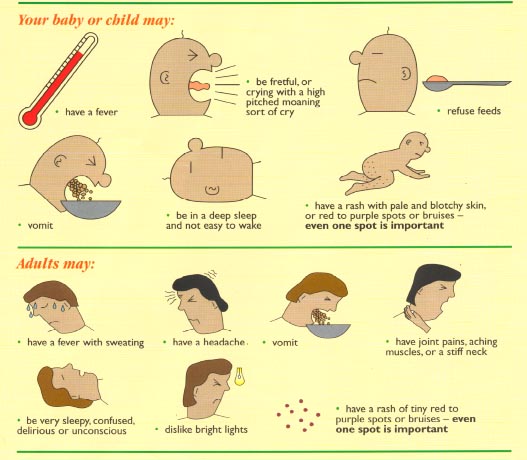c/- Grey Lynn Community Centre, 510 Richmond Road, Grey Lynn. Phone 378-4565
Grey Lynn Plunket
c/-
Grey Lynn Community Centre, 510 Richmond Road, Grey Lynn. Phone
378-4565
Caring for Young Families - Whanau Awhina
23rd November 2001 Meningococcal Meningitis
Meningoccal
disease
can progress very quickly.
Don't wait - take action!
Early treatment with antibiotics is vital in battling meningococcal disease. As many as 50% of the population may be carrying the meningococcal bacteria in their nose and throat at one time. Babies and young people are most at risk, and the most likely to develop blood poisoning or meningitis. The bacteria can be spread by close contact with someone carrying it. This happens usually without causing harm.
"Close contact" means
• living in the same household,
• sleeping in the same room,
• attending the same pre-school for more than just a few hours a week,
• sharing drink bottles, or eating utensils,
• kissing.
Meningoccal disease
Meningoccal disease is a bacterial infection, caused by a bacterium (germ), Neisseria meningitis, known as Meningococci. It usually affects the membrane around the brain (Meningitis), or the blood (septicæmia). It causes two very serious illnesses:
• septicæmia (blood poisoning)
• Meningitis (an infection of the brain membranes.)
Prompt treatment with antibiotics (usually by injection) can prevent death, or permanent disability such as damage to the brain or deafness. It is vital that treatment is begun promptly.
Who is at risk?
Meningoccal disease can affect anyone, but babies, young children, teenagers, and young adults are at greatest risk.
Signs
& symptoms
(What you can see and feel)
Meningoccal disease can look like a case of the 'flu in its early stages, but it quickly gets much worse. The symptoms may not all show up at once. Tell your doctor about any of the following signs and symptoms:

The rash can occur anywhere on the body. Even one spot on a sick child or adult is important, so show it to your doctor.
Don't wait - take action!
If you suspect that you or someone in your household may have Meningoccal disease:
Ring a doctor or Medical Centre right away - whether it is day or night.
Say what the symptoms are.
Insist on immediate action - don't be put off - a life may be at risk.
The illness
Illness may develop gradually over one or two days, or may develop quickly over a few hours, so:
Watch anyone who has these signs. They may get worse very quickly.
Do not leave them alone - they may need help urgently.
If they keep getting worse, go straight back to your doctor.
Even if a person has been cleared by a doctor, they should still be watched in case they get worse suddenly.
If Meningoccal disease is treated straight away with antibiotics, most people will recover.
Prevention
Meningoccal disease is spread in a similar way to the common cold. Bacteria live in the back of the nose and throat, and are spread by coughing, sneezing, kissing, and sharing food and drink (bottles, cups, cutlery) with an infected person. The bacteria hardly ever cause disease. They mostly sit harmlessly in the throat.
Antibiotic treatment
Adults and children who have been in close contact with someone who has Meningoccal disease should get antibiotic treatment, preferably within 24 hours. Your doctor will arrange this with the local public health service.
Meningoccal vaccine is not available
There is no vaccine for the Type B form of this epidemic, the most common form. There is a vaccine which is occasionally used for other strains. Your doctor or local public health service will advise on this. Remember, prevention and antibiotics are the only answer.
Smoking
Smoking can weaken the body's defences against the bacteria which cause Meningoccal disease. People living in smoke-free homes are less likely to get serious infections.
Where to go for advice on Meningoccal disease
If you want to know more, click here. Background art on this page by James.
For details of our Clinic hours, click here. Child restraints for cars: click here for a report. And taking care of yourself is important too: click here for suggestions. To see a chart of infectious diseases, click here for page one and here for page two.
Recipes l Plunket page l Plunket News l Photos l Child safety precautions l Community Centre
Disclaimer: The views expressed on this website do not necessarily represent those of The Royal New Zealand Plunket Society.